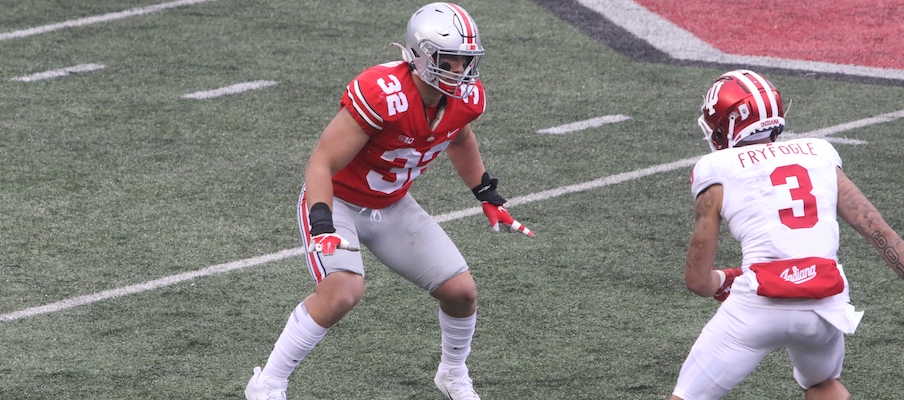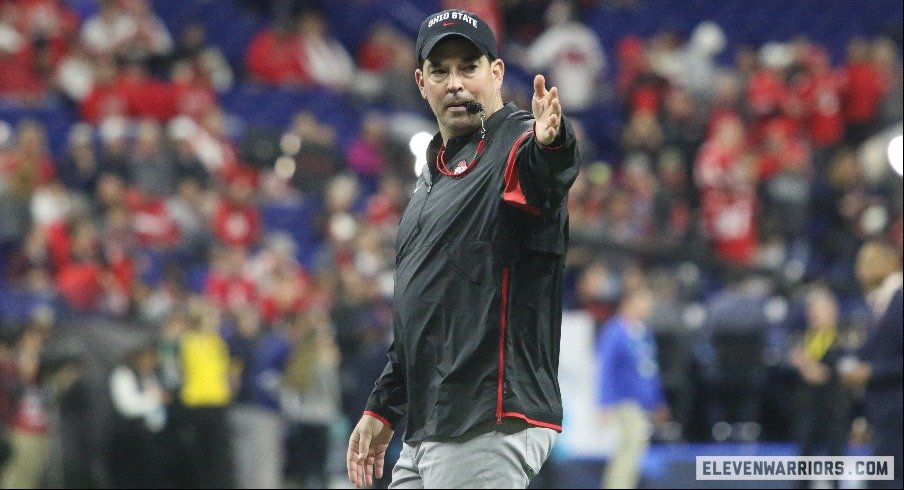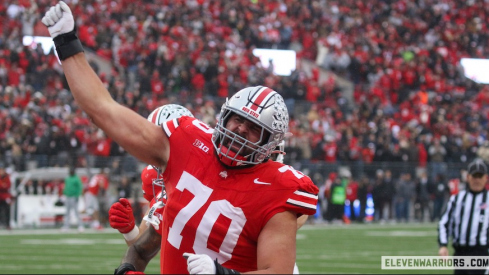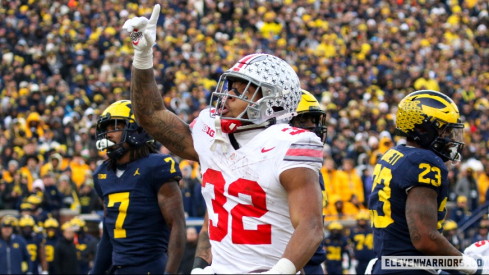Ready or not, the postseason has arrived for Ohio State.
It certainly doesn’t feel like Ohio State’s regular season should be over, considering the Buckeyes have only played five games, less than half of the 12 they typically play. But after three of their final five games in an already shortened regular season were canceled, including the rivalry game they were supposed to play against Michigan this week, all they have left are two or three postseason games.
The good news for Ohio State: Winning those five regular-season games was enough for the Buckeyes to make the Big Ten Championship Game (after the Big Ten removed the six-game requirement for qualifying for the championship game), and getting a sixth win in that game against Northwestern next weekend could be enough for the Buckeyes to make the College Football Playoff.
Some people view that as a competitive advantage for the Buckeyes. It is true that Ohio State has had significantly fewer opportunities to lose than the other teams garnering serious consideration for a playoff berth, and also true that the Buckeyes could have less wear and tear on their bodies because they’ve played a shorter season.
“You can’t give them everything,” Rece Davis said on ESPN’s College Football Playoff selection show on Tuesday night. “If they get into the playoff, they’re going to be fresher than the other teams … if they get in, they’ll have a big advantage because they’re going to be fresher, and they’re certainly good enough whether they’re fresh or not to win the national championship.”
That said, playing fewer football games also means fewer game reps. It means the Buckeyes who are in their first years starting or contributing regularly are still relatively inexperienced, and most of their backups haven’t had many opportunities to play at all. Even the best teams usually get better as the season progresses – Ohio State’s last national championship team in 2014 was a prime example – but this year’s Buckeyes simply haven’t had that many opportunities to work through the kinks.
When I asked Ryan Day after Ohio State’s first canceled game against Maryland if he was worried his team wouldn’t get where it needed to be because of all the cancellations, he didn’t seem overly concerned.
“I think that if we’re able to play our schedule and play in the championship game and everything like that, then we’ll be right where we need to be,” Day said on Nov. 17. “And I think a lot of the schools … when you look throughout the country, they’ve missed games, they’ve had people miss time. It’s just been kind of crazy.”
But that was before the Buckeyes had two more games canceled, and even then, he acknowledged “it certainly hurts when you’re not playing games.” Now, the Buckeyes have played just two games in five weeks, and have played at least three fewer games than every other team in the top 11 of the College Football Playoff rankings.
The most obvious area in which that’s hurt Ohio State is developing its depth, as the Buckeyes simply haven’t had many opportunities to play their backups. That changed a little bit against Michigan State; partly due to necessity, as they had several starters unavailable following the COVID-19 outbreak that forced Ohio State to cancel its game against Illinois two weeks ago, but they were also able to take their starters out early as they won 52-12. Still, the opportunities for most of Ohio State’s backups to play have been few and far between – perhaps most strikingly, no backup quarterback has even attempted a single pass – which could put the Buckeyes in a precarious spot if any of their starters become unavailable for their biggest games of the year.
“There’s a handful of guys, probably more than a handful of guys, who just haven’t seen as many reps because of the way the season (has gone),” Day said Thursday. “We usually have played seven more games and (three) non-conference games, and so, it’s hard, because they haven’t gotten those reps. So some of those guys got the reps on Saturday, and that was great to see some of these younger guys step up.”
While it’s certainly possible for the Buckeyes to get better in practice, they enter the postseason far less battle-tested than they typically would be. That might not hurt them against Northwestern, who will have played only two more games than Ohio State and will be at a significant talent disadvantage against the Buckeyes, but it certainly could hurt them in a hypothetical playoff game.
How so? Well, for example, Ohio State has played just one game since its pass defense was shredded for 491 yards by Indiana. The pass defense looked better against Michigan State, but even Day admitted the Buckeyes “really weren’t challenged all that much in the back end in that game, to be quite honest.” And now, the only additional game they’ll play before the CFP – where, if they make it, they could hypothetically face a matchup with Trevor Lawrence and Clemson or Mac Jones and Alabama – is against a Northwestern offense that’s ranked 94th nationally in passing yards per game.
Given that it’s unprecedented in modern college football for a team to be entering the postseason after playing just five regular-season games, we can’t definitively say how that might help or hurt the Buckeyes. But to assume that gives Ohio State a clear or unfair advantage ignores the value of the experience lost by having so many games canceled.

The Buckeyes couldn’t control the fact that they had so many games canceled, nor the fact that the Big Ten wouldn’t allow them to schedule replacement games against non-conference opponents. They reportedly did contact other schools, including Ohio University, about potentially playing this week, though that ultimately didn’t pan out.
But it was clear all along that Day and the Buckeyes wanted to play as many games as they possibly could, that they thought the cons of unexpected off weeks outweighed the pros. There were other reasons for that – the fact that playing only five games would have made them ineligible for the Big Ten Championship Game before the rules were changed, the fact that their playoff hopes could be more secure right now if they had played more games and simply just wanting their players to get as many games as possible after sacrificing so much for the chance to play – but one reason was that they wouldn’t have as many opportunities to develop and improve without those games.
Will that end up hurting the Buckeyes now that they have to be ready to play at a championship level in every game from here on out? Either way, we’re about to find out, as no tune-up games remain.


